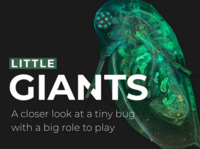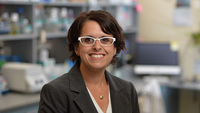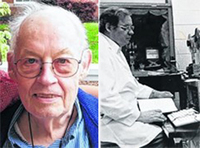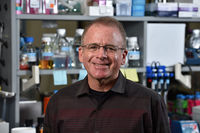Little Giants: A closer look at a tiny bug with a big role to play

Michael Pfrender sits facing a whiteboard in his lab at the Galvin Life Science Center. He’s discussing the genomics of Daphnia – water fleas, found in every standing body of water in the world – and has a tendency to sketch when he speaks. “You want to see some of them?” he asks. “That’s the fun part, right?” At the back of the lab, two beakers sit on a table near a microscope. There isn’t much to see at first glance. Even leaning in, Daphnia are so small they look like bouncing flecks in the water, frantically trying to keep afloat.
New study finds mycobacteria can sense presence of proteins that cause disease

Tuberculosis-causing mycobacteria use a select group of proteins known as virulence factors to transmit the disease, which infects roughly one third of the world’s population and causes 1.7 million deaths annually. Those proteins are cargo transported by molecular machinery, a microscopic gateway that promotes the survival of bacteria in the host. A new study by researchers at the University of Notre Dame and Michigan State University, published in the Proceedings of the National Academy of Sciences, reveals that mycobacteria can sense when this molecular machine is present.
In Memoriam: Professor Emeritus Harald E. Esch

Dr. Harald E. Esch, Professor Emeritus of Biological Sciences, passed away peacefully on October 7, 2017, at the age of 85 in Farragut, TN. Dr. Esch was born in 1931 in Dusseldorf, Germany. Originally trained as a physicist and mathematician at the University of Bonn and Free University, Harald shifted to biology for his doctoral studies. At the University of Würzburg, Harald studied with Dr. Karl von Frisch, the 1973 Nobel Prize Laureate in Physiology or Medicine best known for his pioneering work on the ‘waggle dance’ of the common honeybee, Apis mellifera. Under von Frisch’s tutelage, Harald earned a doctorate in 1960 in Zoology and Mathematics for his work on insect chemosensory physiology. Harald remained in Germany until 1964 as an Assistant Professor in the Radiation Research Laboratory at the University of Munich Medical School, where he worked on the effects of ionizing radiation on cell membranes.
Biology professor’s textbook nominated for prestigious PROSE Award

In 1996, biological sciences professor Gary Lamberti published the first edition of his textbook to fill a major need in aquatic science. Twenty-one years later, Methods in Stream Ecology, now in its third edition, is up for consideration for a prestigious PROSE Award, an annual accolade that recognizes the best in professional and scholarly publishing.
Fighting Mosquito-borne Diseases

“In general, cases of Zika have definitely decreased in most of Central and South America, but the virus is not gone. The mosquitoes carrying Zika and other diseases are still there, and the risk for another infection outbreak is still quite prevalent,” says Elitza Theel, director of the Infectious Diseases Serology Laboratory and co-director of the Vector-Borne Diseases Service Line at Mayo Clinic. Though Zika virus was identified in 1947, the World Health Organization (WHO) says it was largely localized for 60 years. In 2007, the first recognized outbreak of Zika affected 5,000 people on Yap Island in the Federated States of Micronesia. From there, it moved to French Polynesia and then in 2015 to Brazil, where an outbreak quickly devastated South America.